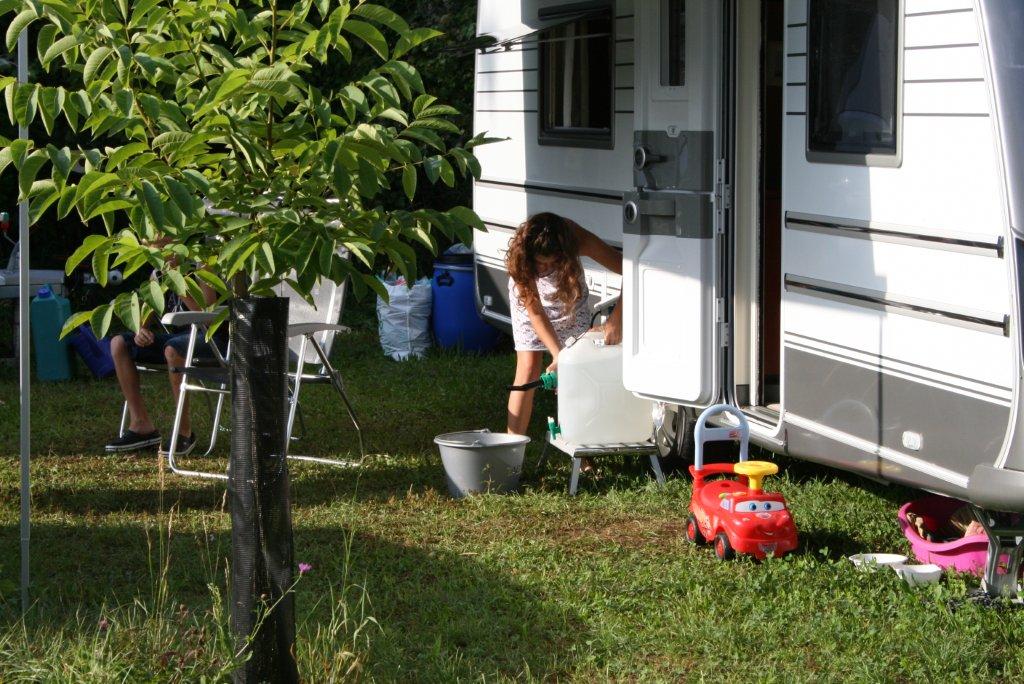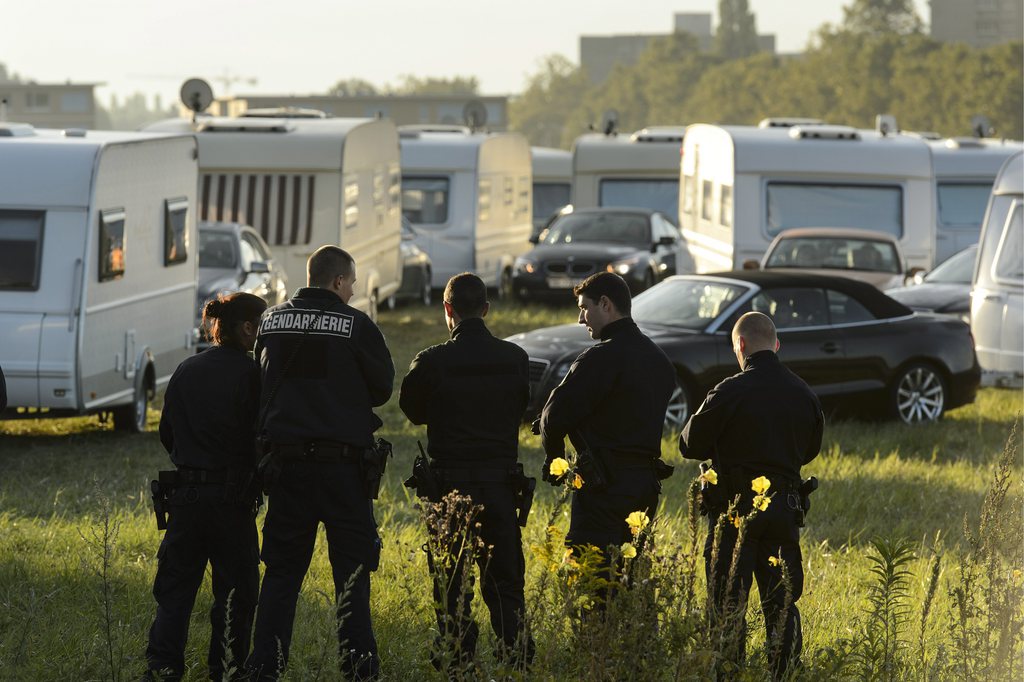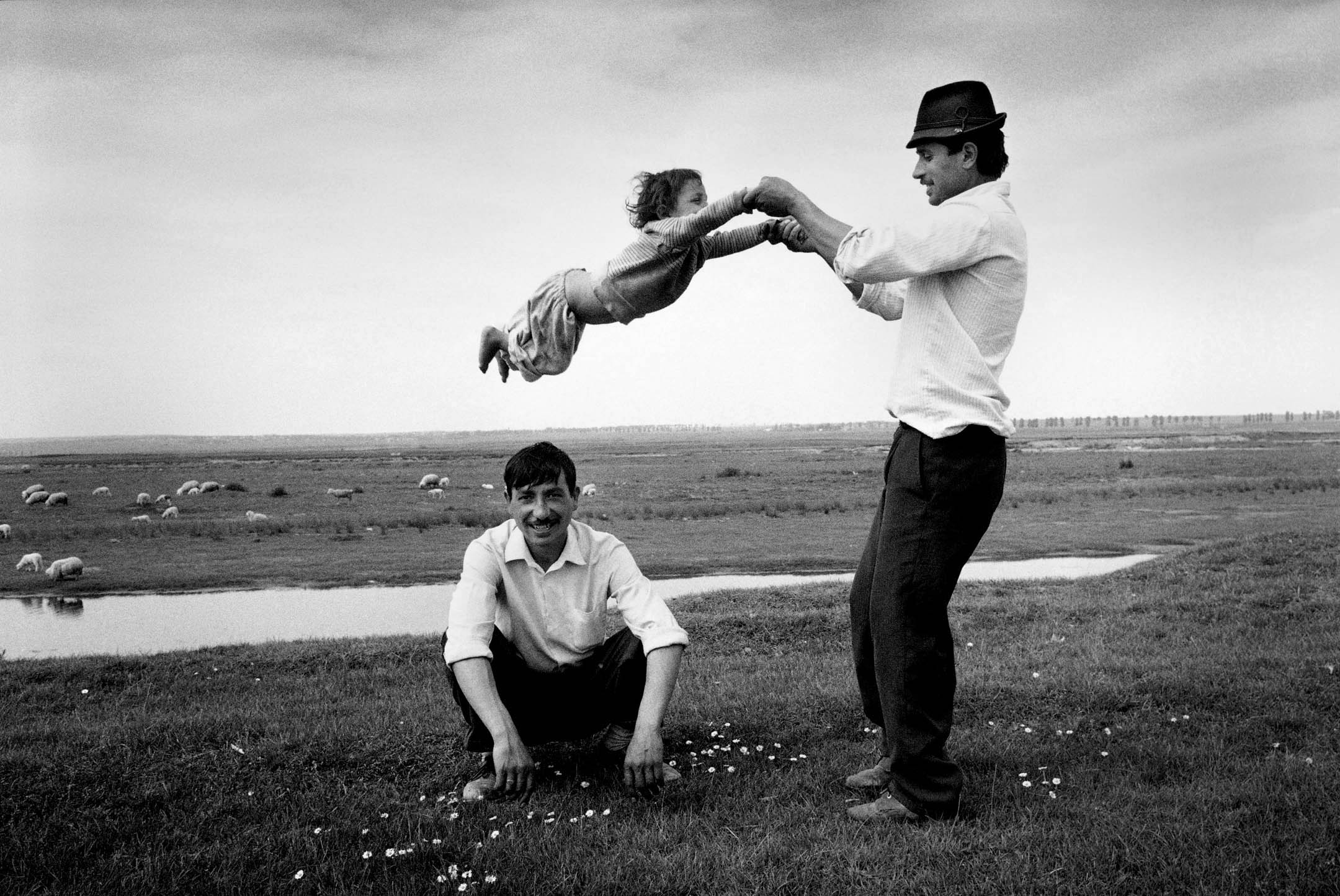“We get a lot of insults and are even shot at”

A dog is barking inside the campground. Washing flaps in the sun as toys lie strewn across the grass. Half a dozen caravans and several cars parked here belong to the Jenish travelling community, by far the biggest in Switzerland.
To reach the site we turn off the road around a kilometre before the village of Yvonand, in canton Vaud. After going through a forest, we end up in a valley which is skirted by the A6 highway. All in all, the campground takes up about 1,000 square metres. It’s surrounded by greenery.
In front of every mobile home, there is a table and a couple of chairs, and next to them, small tanks of water. A river does skirt the campground, but there is no drinking water. There is no provision made for rubbish or waste.
At 8:30 am municipal councillor Olivier David turns up at the site. He’s accompanied by the employee who oversees the campground. Sylvie Gerzner, president of the Swiss Jenish organisation, has also come along.
There is room for ten families on the campground, but as it’s the end of the season, there are only three here. Patrick and Nicole, Sylvie’s cousins, are on the road with Nicole’s parents. Their adult children have settled down in the area. The two other families have two caravans each, with the adults sleeping separately from the children.
The men have mostly left to go to work. Patrick, however, wanted to meet up with the authorities, as he wants to prolong their stay — initially set at ten days.
“It’s a bit too short for me to call on all of my clients,” he says.
“You may stay,” agrees the local councillor. “There is enough room.”
A few trouble-makers
Patrick uses his time with the councillor to point out that the red and white entry gate is 2.5 metres high. “We cannot get the caravans in or out without calling up the village authorities. I feel a little bit like we are shut in here. And also, we often travel at the weekend.”
The councillor explains that there had been problems in the past when the authorities would come to collect taxes.
“We would arrive to find a dog in front of a closed gate. Caravans would come and go without warning and would leave rubbish behind. In 2003 we came to the conclusion that travellers would simply have to declare their arrival at the village and pay a deposit.”
“We put this gate here so we could control the traffic. As far as weekends go, you just have to call me and I will come and open the gate for you.”
David adds: “We have never had any problems with your family. It’s a shame, but you are to some extent the victims of a few people who do not behave as they should.”
Has the village had any problems with large parties of gypsies who have caused conflict elsewhere this year? “No, our camping ground is small and we are quite far from the motorway. The Roma prefer to stay closer to the main routes,” says David.
The appointment comes to an end, and Patrick heads off to work. “I sell things from door to door, I do odd jobs, plastering, whatever I can find, really.” Nicole has made some coffee, and continues her conversation with Sylvie, who is still playing the role of representative, not cousin.
Fewer spots
“When my grandparents were still alive, we often came to this campsite, but we didn’t have to declare our arrival – we would just sort things out between us. At that time, pretty much every village had some room for us. Today this is one of very few that remain. It is quite hard to find campgrounds in French-speaking Switzerland.”
Many former gypsy-friendly grounds have changed into tourist campsites, which don’t welcome travellers. “At some campsites, we are sometimes asked to leave, in order to make way for tourists. It’s hurtful because we are Swiss citizens,” adds Sylvie.
The campsite at Yvonand is not perfect but it is calm and set in the countryside, which fits the needs of the Jenish, who don’t like to be at the edge of busy roads and who travel in small groups.
“Ideally there would be ten more camping grounds like this one, but we are very get-up-and-go by nature. We telephone here, there and everywhere in order to find places to stay,” says Sylvie. She does regret that farmers are less and less amenable to renting out their fields because of pressure from their neighbours.
“Happily, the situation is a little better in German-speaking Switzerland, and we spend a part of each season there.”
The biggest problem is access to water. “Here, we pay SFr10 ($10) per day, but to get water we have to walk down to the cemetery. In some villages they call us thieves and refuse access to the spring. It’s ironic when you hear talk about access to water being a problem in developing countries,” says Sylvie.
Suspicion
Another problem is that travellers’ bad image precedes them. They say there is also an intolerance of minorities and foreigners. “We get a lot of insults, and are attacked by skinheads and are even shot at,” says Sylvie. “To say nothing of jealousy. We’re always asked how we can afford our caravans. But they are our sole possessions.”
The Jenish have long been wary of authorities, but this reached new heights after government campaigns to force sedentary lifestyles from 1926 to 1973, in order to fight “vagabonds”.
“When it comes to the state, we have to rebuild mutual trust. We find it difficult to entrust our children to a school. I left school in the fifth year of primary school because I was treated badly.”
When the Jenish sell their wares from door to door, they keep up a regular link with their clients, but nevertheless remain discreet. “People don’t know who we are because we don’t tell them. In any case, we don’t look any different to them.”
The Jenish language is Switzerland’s fifth national language, and the Jenish keep very close links to their culture, says Sylvie.
“Family ties remain strong, even with those who choose a settled lifestyle. Any one of us can decide to take to the road at any minute. The most difficult thing is having to balance culture and work. But when the swallows arrive, it’s time for us to leave.”
But with the cold season approaching, having travelled since March throughout Switzerland, Patrick, Nicole and her parents will settle down for the winter in an apartment near Cudrefin.
Originally from Austria, Germany and Switzerland, the Jenish people number around 100,000 in Europe. They speak the Jenish language, a language derived from Yiddish which varies from place to place.
In Switzerland, 90% of travellers are Jenish. It is estimated there are 30,000, and that 10% of them are semi-nomad.
They are registered as residents in the village where they spend the winter and where their children go to school. If they take to the road from February-March and August-October, the Jenish children complete their schoolwork under the supervision of parents or private teachers.
The Jenish travel only around Switzerland, in “families” of up to 20 people and groups of 2-8 caravans. They have traditionally worked as plasterers, peddlers, basket-weavers and fairground workers. They are Christians and get together in large convoys for pilgrimages, such as to Saintes-Maries-de-la-Mer in France, which happens every May 24-25 and brings many travellers from Europe together.
Switzerland has taken sometimes drastic steps to assimilate the Jenish.
Between 1926 and 1973 more than 600 children were taken from their families via the “Enfants de la grand-route” (children of the road) operation, led by the Pro Juventute foundation.
In 1987, Swiss President Alphons Egli presented the government’s apology. Ten years later, the government created a foundation to improve the living conditions of nomadic peoples and to respect their cultural identity.
The Jenish have been protected by the Council of Europe convention on national minorities since 1997.
(Translated from French by Victoria Morgan)

In compliance with the JTI standards
More: SWI swissinfo.ch certified by the Journalism Trust Initiative


You can find an overview of ongoing debates with our journalists here. Please join us!
If you want to start a conversation about a topic raised in this article or want to report factual errors, email us at english@swissinfo.ch.